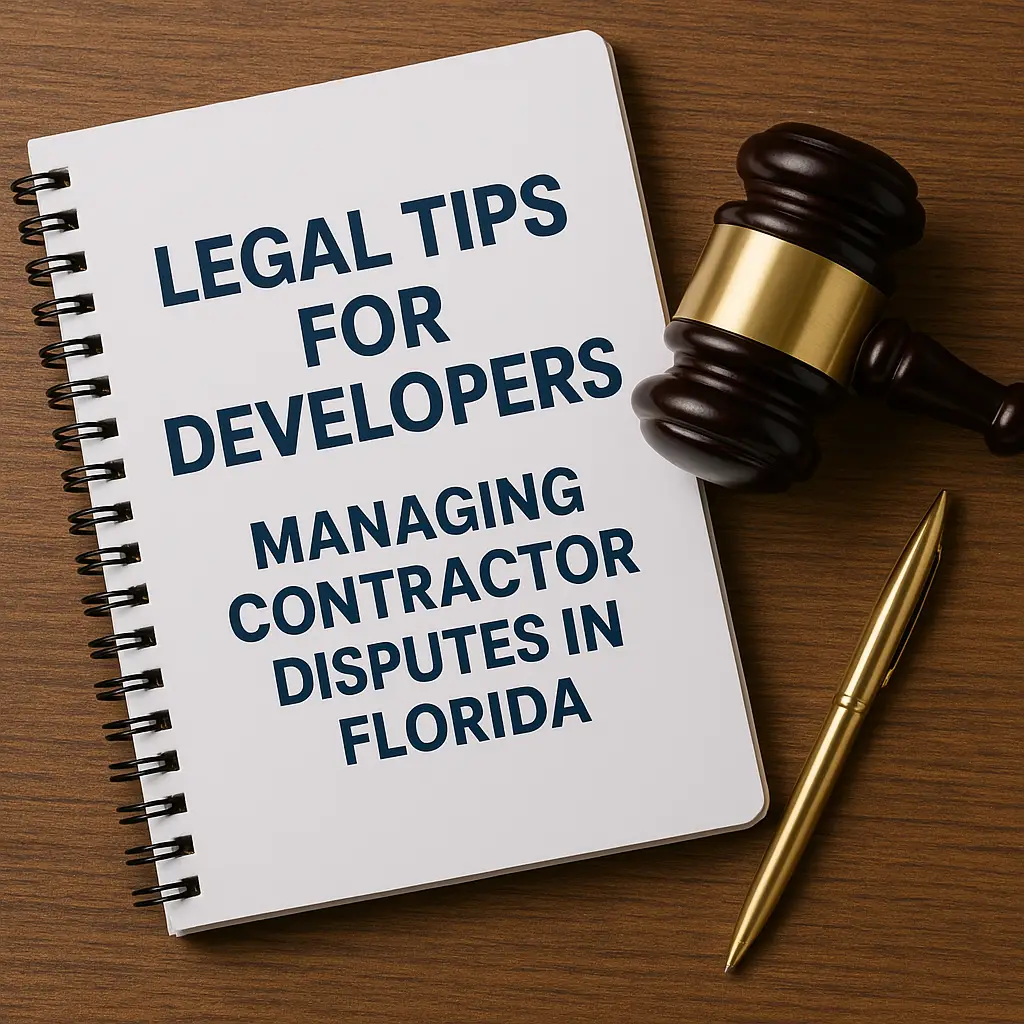If you’re a developer in Florida, disputes with contractors aren’t just inconvenient — they can delay projects, increase costs, and threaten your bottom line. From missed deadlines to payment conflicts or construction defects, it’s critical to manage contractor issues proactively and legally to keep your project moving.
This guide outlines key legal tips for Florida developers to avoid, manage, and resolve contractor disputes — and protect the value of your investment.
1. Start With a Strong, Developer-Friendly Contract
The best way to avoid disputes is to anticipate them in writing. Florida law honors contract terms — and many disputes come down to what’s (not) in the agreement.
Every developer-contractor agreement should include:
- A detailed scope of work and exclusions
- A realistic construction schedule with milestones
- Clear payment terms and lien waiver requirements
- Change order procedures in writing
- Liquidated damages for delays (or incentives for early completion)
- Dispute resolution clauses (mediation, arbitration, venue selection)
- Insurance and indemnity provisions that comply with Florida law
✅ Pro Tip: Make sure the contract specifies that written notices are required for claims, changes, or time extensions — verbal agreements lead to litigation.
2. Track Progress and Issues in Real Time
Developers should stay engaged during construction by:
- Requiring regular reports and schedule updates
- Documenting site visits and meetings
- Keeping a record of change requests and approvals
- Monitoring payment applications and lien releases
If a dispute arises, your documentation will be your strongest defense — especially in delay or defect claims.
3. Use Lien Waivers Strategically
Always require partial and final lien waivers as a condition of payment. These protect you from subcontractor and supplier lien claims — even if your GC fails to pay them.
You should:
- Confirm that waivers are signed before each draw
- Use conditional waivers until checks clear
- Require a contractor’s affidavit before final payment
Florida’s lien law allows unpaid subcontractors to lien your property — even if you paid your contractor in full — so lien waivers are essential.
4. Respond Quickly to Warning Signs
Contractor issues rarely appear out of nowhere. Look for red flags such as:
- Missed deadlines with vague explanations
- Slow or irregular communication
- Subcontractor or vendor complaints
- Requests for accelerated payments
- Poor jobsite coordination or supervision
When these issues arise, don’t wait. Consult your contract, document the issue, and send a written notice to cure if necessary.
5. Know When and How to Terminate
Florida courts uphold terminations only when done properly. Before terminating a contractor:
- Review your contract’s termination for cause and convenience clauses
- Provide required notice and cure opportunities
- Confirm the contractor has materially breached their duties
- Document every step with time-stamped photos, letters, and site reports
Improper termination can result in delay claims, lost productivity, and even wrongful termination lawsuits.
✅ Pro Tip: Have a qualified replacement contractor ready before termination — and make sure transition plans are in place.
6. Preserve Your Right to Sue (or Defend)
Florida has strict requirements for:
- Notices of defect under Chapter 558 (for owners and HOAs)
- Written notice of claims for delay or extra work
- Filing and responding to liens, claims, or demands for arbitration
Make sure your team works with legal counsel to:
- Preserve evidence
- Comply with notice requirements
- File claims or defenses before deadlines expire
7. Don’t Wait to Involve a Construction Attorney
Disputes are less expensive and easier to resolve early — especially with the right strategy in place. An experienced Florida construction attorney can help with:
- Contract enforcement
- Notice to cure letters
- Mediation or arbitration
- Lien defense
- Termination planning
- Delay or nonperformance claims
Even if you don’t end up in court, legal guidance during the dispute can help you maintain leverage and control the outcome.
How Douglas Firm Helps Florida Developers
At Douglas Firm, we represent developers and property owners throughout Florida in:
- Drafting and enforcing construction agreements
- Managing contractor performance issues
- Handling lien claims, change order disputes, and project delays
- Terminating contractors properly and transitioning work
- Resolving disputes through negotiation, mediation, or litigation
We protect your project timeline, budget, and investment.
Contact Douglas Firm Today
If you’re dealing with a contractor dispute — or want to avoid one — contact us today to put a smart legal plan in place.
📞 954.474.4420
📧 andrew@douglasfirm.com
🌐 www.douglasfirm.com

